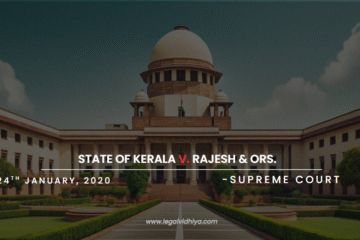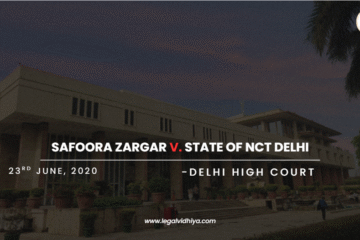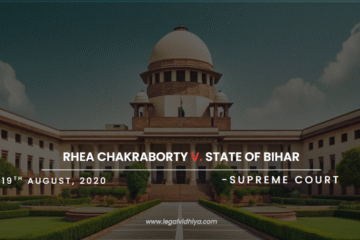
| CITATION | AIR 2020 SUPREME COURT 4794 | |
| DATE OF JUDGEMENT | 31st August, 2020 | |
| COURT | Supreme Court Of India | |
| APPELLANT | Mukesh Singh | |
| RESPONDENT | State | |
| BENCH | J. Arun Mishra, J. Indira Banerjee, J. Vineet Saran, J. M.R Shah, J. S. Ravindra Bhat | |
| BENCH TYPE | Constitutional Bench | |
| CASES REFERRED | Mohan Lal V State of Punjab, Bhagwan Singh V state of Rajasthan, Megha Singh V State of Haryana, V. Jayapaul | |
INTRODUCTION
Mukesh Singh Vs State (Narcotic Branch of Delhi), 2020 is an important case which cleared down the ambiguity subsisting in the case of Mohan Lal Vs State of Punjab. It cleared the major concept on when an informant who is a complainant can also be an investigating officer. It also explained the difference between when a case is changing into biasedness and when its not. The case involves appellant Mukesh Singh and respondent state with appellant lawyer Shri Ajay Garg and respondent lawyers Shri Tushar Mehta and Shri Aman Lekhi. This was a remarkable case in the year of 2020.
FACTS OF THE CASE
The constitutional bench was so formed in order to decide the constitutional validity of the Hon’ble 2018 bench, Mohan Lal Vs State of Punjab.
Mohan Lal was the main protagonist in the case. The case was about a formal criminal investigation where the informant was also the investigating officer (IO) but it was not something unusual until it was made unusual. The issues were raised that can the IO and informant (complainant) be the same person? And if so, what is the validity of the next investigation?
The arguments laid down in this case were (a) The police officer who has collected the drug and has followed the procedure cannot investigate the same case as an IO and (b) If the procedure continues to take place, then it’d be changed because its arbitrary and biased in nature.
The facts of Mohan Lal were clear that it can only be applicable to criminal cases including NDPS Act and hence, ambiguity arose in the case of Mukesh Singh by two jury within a year.
Similarly, in the case of Varinder Kumar Vs The State Of Himachal Pradesh which had a quorum of three judges where two of them gave judgement in Mohan Lal also gave the majority according to Mohan Lal’s judgement and held that informant and IO cannot be the same person.
ISSUE RAISED
- Whether in a case where the police officer is both the IO as well as the informant who is also the complainant himself, the trial is vitiated and the accused is eligible for acquittal?
ARGUMENTS RAISED BY APPELLANT
The arguments were presented by Shri Ajay Garg, a learned senior attorney.
- In the given case, the complainant was the informant as well as the IO. Therefore, the trial should be vitiated and the accused should be given the eligibility for acquittal.
- The case of Mohan Lal is totally based on the foundational principles of constitution and criminal procedure. In this case, the Apex court specifically dealt with the major issue that is whether in criminal proceedings, the principles of fair play, justice, equity and good conscience is respected if the police officer is the informant as well as the IO and whether this is amounting to accused’s discrimination and is inconsistent with the provisions mentioned in the NDPS Act. The accused is also a human being and also has right to speedy justice, fair trial, etc. under Article 21. NDPS also carries reverse burden of proof that is the accused has the burden of proof where in the normal cases, it’s the complainant who carries burden of proof. Dowry is a perfect example of reverse burden of proof.
- The Apex court laid down in the aforesaid case that if the investigation is itself misleading then the informant and IO cannot be the same person because it will amount to arbitrariness which will further violate the rule of law.
- The counsel for Appellant also cited down cases like Bhagwan Singh Vs State of Rajasthan, Megha Singh Vs State of Haryana, state of inspector of police, NIB, Tamil Nadu Vs Rajangam, it was held that the IO and the informant can’t be the same police officer who is the complainant himself. Therefore, the trial was vitiated and the accused was held eligible for acquittal. In this way, there was no abuse of powers by the authority and Article 21 of Indian constitution isn’t violated and no ambiguity or uncertainty will arise among the police, lawyers, and others.
- In the NDPS Act, it is also mentioned that the recovery and investigation should be made by different officers as mentioned in Sections 42 and 53. Section 42 clearly states about entry, search, seizure and arrest and it doesn’t mention anywhere about investigation.
- An accused deserves a fair investigation as of Article 21 of the Indian constitution. This was also seen in the case of Romila Thapar Vs UOI
ARGUMENTS RAISED BY RESPONDENT
The arguments for respondent were presented by Shri Tushar Mehta and Shri Aman Lekhi, both are learned solicitor general of India.
- Section 157 of Cr.P.C allows that a police officer who is the complainant himself can be both informant and IO in the cases of cognizable offence. Section 156 of Cr.P.C states about investigation while Section 157 states about the police officer who has collected the information during investigation can arrest the accused.
- In the case of Bhagwan Singh, he was the head constable who caught the accused for smuggling of grains and reduced into writing (FIR) under section 161 of IPC for providing 510INR as bribe to police. In this case, Bhagwan Singh was both informant as well as IO and there were no presence of any witness other than Bhagwan Singh and therefore, due to absence of other witnesses, the court mentioned that IO and informant can’t be the same person. So, basically the decision varies according to facts and circumstances of case and was not an absolute judgement laid down by the court in this case.
- NDPS was a special enactment and comes under the purview of IPC. U/s 304B of IPC, it provides powers to Cr.P.C to give punishment if a person has violated any provision of IPC. IPC also works according to Cr.P.C that, is they both go hand in hand and are consistent in nature and therefore, it also provides safeguard to the complainant who is both informant and IO.
- The right to investigate utterly lies with police. Their exclusive work is to investigate a case or a crime scene. The power is also reserved for them under Cr.P.C. It is rarest of rare cases where abuse of authority can be seen and it’s the duty of judiciary to decide whether the same person should be IO and informant if the court thinks that the case is leading to biasedness.
OBSERVATIONS BY SUPREME COURT
- Supreme court in the case of Bhagwan Singh Vs State of Rajasthan stated that the case was totally relied upon the facts and wasn’t an absolute judgement laid down by the court and therefore, the trial was vitiated and the accused was held eligible for acquittal.
- Also, in the case of Megha Singh Vs State of Haryana, the judgement was based on the facts of the case and was not an absolute judgment.
- In the case of V. Jayapaul, the IO if he was the informant isn’t barred to investigate a case by the law. If the case shows likeliness of bias, then the court can grant different persons to be informant and IO.
- The Apex court also stated that there was no mention of informant and IO being different or same persons under NDPS Act in the sections of 41, 42, 43, 44 and 53. It’s totally silent as to the issue therefore, it’s a misinterpretation as there is no mention of who can be IO and Informant in the provisions of NDPS Act.
JUDGEMENT BY SUPREME COURT
The judgement laid down by the Hon’ble Supreme court was that in the case where IO and Informant are the same person and also the complainant, the trial isn’t vitiated and thus, the accused isn’t held eligible for acquittal.
The Supreme Court also looked back to the cases of Bhagwan Singh Vs State of Rajasthan, Megha Singh Vs State of Haryana, state of inspector of police, NIB, Tamil Nadu Vs Rajangam, and stated that it was based on the facts of the cases and not any absolute judgement. Therefore, the trial was vitiated and the accused was held eligible for acquittal.
CONCLUSION
To sum it up, this case was a remarkable case as it cleared the ambiguity and respected the principles of fair play, justice, equity and good conscience. It also respected the Article 21 of Indian constitution. It provided the powers to police authority to be IO and informant until and unless there is no sign of biasedness and cleared the misinterpretation which arose in the provisions of NDPS Act.
REFERENCE
This case analysis is written by Arpeeta Dash, a student of Symbiosis Law School, Nagpur; an intern at Legal Vidhiya.
Disclaimer: The materials provided herein are intended solely for informational purposes. Accessing or using the site or the materials does not establish an attorney-client relationship. The information presented on this site is not to be construed as legal or professional advice, and it should not be relied upon for such purposes or used as a substitute for advice from a licensed attorney in your state. Additionally, the viewpoint presented by the author is of a personal nature.




0 Comments